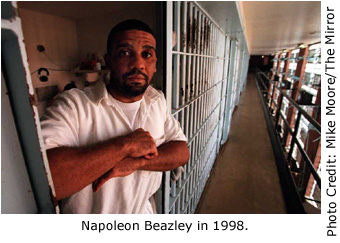
Kentucky Governor Supports Ban on Executing Juvenile Offenders
Governor Paul Patton stated that he would support a bill to ban the execution of those who committed capital crimes as juveniles. “The death penalty is for cases that cry out for it,” said Patton. “It’s not for every case.” Dennis Fleming, Patton’s general counsel, stated that the governor “questions whether 16 or 17-year-olds are capable of fully understanding the consequences of their actions.” The proposed legislation may also have support from a number of state prosecutors, according to George Moore, president of the Kentucky Commonwealth’s Attorneys Association. (Courier-Journal (Kentucky), 10/17/01)
If passed, the legislation would not apply retroactively to Kevin Stanford, the only juvenile offender on Kentucky’s death row. Patton, however, stated that he would have reservations about signing a death warrant for an inmate convicted of a murder he committed when he was 17. The Governor said he would “examine Stanford’s case closely” if the legislation prohibiting such executions was enacted and Stanford exhausted his appeals during Patton’s term. (Lexington Herald-Leader, 10/18/01)

Juvenile Offender Executed in Texas
Gerald Mitchell was executed in Texas on October 22 for a shooting and robbery he committed when he was 17-years old. (Associated Press, 10/23/01) This is the 18th execution of a juvenile offender since the death penalty was reinstated and the only one this year.
Texas has accounted for more than half of the juvenile offenders executed in the U.S. since 1976. In the past 2 years, only Texas and Virginia have executed juvenile offenders, and Virginia currently has no such offenders on its death row.

No More Juvenile Offenders on Virginia’s Death Row
The Virginia Supreme Court recently overturned the death sentence of the only juvenile offender on Virginia’s death row. The court ruled that Shermaine A. Johnson’s death sentence should be vacated and he should receive a new sentencing trial because his jury was not told that Johnson would not be eligible for parole if sentenced to life imprisonment. The state attorney general’s office acknowledged that Johnson’s jury should have been told that a life sentence really meant life. (Washington Post, 9/25/01) Last year, the only other juvenile offender on Virginia’s death row, Chauncey Jackson, had his conviction overturned. The state decided not to pursue the death penalty at his re-trial.

Texas Legislators Urge Governor to Commute Juvenile Death Sentence
Eighteen state legislators asked Texas Governor Rick Perry to commute Napolean Beazley’s death sentence, citing the fact that he was only 17 at the time of the crime. “Texas’ practice of executing juvenile offenders like Napoleon runs counter to a well-established worldwide norm,” the lawmakers wrote. “Every nation with a working government, except the United States, has ratified the United Nations Convention on the Rights of the Child, which bars giving the death sentence to anyone under 18 at the time of the offense.” The letter also noted that Smith County state District Judge Cynthia Stevens Kent, who presided over Beazley’s trial, had also written to Perry and recommended that he commute Beazley’s death sentence because of his age at the time of the crime. (Houston Chronicle, 9/20/01)

Texas Court Grants Stay for Juvenile Offender

Napoleon
Beazley was granted a stay of execution by the Texas Court of Criminal
Appeals just hours before his scheduled execution. (Associated Press,
8/15/01) Beazley, who was 17 at the time of the crime, would have been
the 18th juvenile offender executed since the death penalty was
reinstated, and the 10th juvenile offender executed in Texas.
The American Bar Association, the Children’s Defense Fund, the European
Union, and the National Mental Health Association have all written
letters to Texas Governor Perry asking that he commute Beazley’s
sentence. The letters note the international consensus against executing
juvenile offenders, and point out that executing Beazley is contrary to
the International Covenant on Civil and Political Rights and the
American Convention on Human Rights. Among those calling for clemency is
Amnesty International, which released a report on Beazley’s case,
“United States of America: Too young to vote, old enough to be
executed.” The report highlights the international, racial, and fairness
issues surrounding Beazley’s case. Beazley, an African-American, was
sentenced to death by an all-white jury for the 1994 killing of John
Luttig, a white businessman whose son is a federal appeals court judge.
At Beazley’s trial, his co-defendants testified against him, but have
since signed affidavits admitting that much of their critical trial
testimony was untrue. They also admit that they testified for the state
against Beazley on the basis of an undisclosed deal that secured them
life sentences. (Amnesty International News Release, 7/31/01 and the
American Bar Association’s Juvenile Justice Project)
Read the report, “United States of America: Too young to vote, old enough to be executed.” For more information, see the American Bar Association’s Juvenile Justice Project’s Web page on Napoleon Beazley.

Victims’ Mother Asks Governor to Grant Clemency in Case of Juvenile Offender Recently Granted a Stay by the U.S. Supreme Court

Antonio Richardson,
who was scheduled to be executed on March 7, 2001 in Missouri, was
granted a stay by the U.S. Supreme Court. Among those trying to prevent
his execution is Ginny Kerry, mother of the murder victims, who asked
the Governor to spare Richardson’s life. Richardson, who was 16 at the
time of the crime, was originally offered a life sentence in exchange
for a guilty plea. Pressured by a local activist, Richardson rejected
the plea and was convicted. Richardson’s lawyer had never participated
in the penalty phase of a capital trial, and failed to present expert
testimony as to Richardson’s mental retardation and brain damage. When
the jury deadlocked on whether or not to impose the death penalty, the
decision went to the judge, who sentenced Richardson to death.
Currently, a bill is pending in the Missouri legislature to exclude the
mentally retarded from execution. (American Bar Association’s Juvenile
Justice Center, Execution Alert, 2/15/01).
For more information on Antonio Richardson and his case, including
recent news articles, please visit the ABA Juvenile Justice Center’s Web
page at www.abanet.org/crimjust/juvjus/richardson.html.



